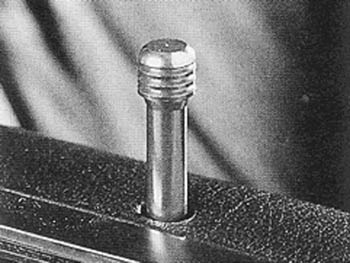![[Metroactive Features]](/features/gifs/feat468.gif)
[ Features Index | Santa Cruz Week | SantaCruz Home | Archives ]
Stakeout!
You might want to keep your door locked to keep out the vermin or other unexpected intruders
By Novella Carpenter
People like Sam Brown, private investigator since 1975, say journalists make good PIs. We know how to scare up facts, smile when asking questions--everything a detective might have to do. I had been thinking about a career change, something more exciting, slightly shady and with lots of car chases. Though I tried to insert myself into the passenger seat with a private investigator, no one would take me with them. Was it my bad breath? My garrulous nature?
Sam Brown, Private Investigator
Mr. Brown, a San Francisco-based investigator who, besides flying to Hong Kong to do international surveillances, runs a detective school (www.sambrowngroup.com), explained it to me. "It's dangerous--a liability. The job in Hong Kong--the guy who took the job previous to me got stabbed." Mr. Brown was so fascinating, I interviewed him about all things related to being a private investigator; here is a small sample of our talk, covering the car end of things.
Sam, let's get the nomenclature down first. Are private investigator and private detective the same thing? What about the word stakeout, is that used anymore?
"Detective, stakeout, those are terms for movies. For cops and television. A private investigator has to have a license to operate, which requires three years of training. Private investigators do surveillances. A stakeout is something in which a house is monitored by the police."
What kind of car do you drive?
"I use a 1999 Mercury Villager, with tinted windows for work. You'll need 22 percent tinted windows. Other vehicles that work are 4x4 Explorers or any kind of minivan, like an Aerostar. I used to have in 1977 Chevy van, one of those things that looks like a surfer van with a little bed and a refrigerator. The best car is one that you can get in and out of easily, you might want to keep your door locked to keep out the vermin or other unexpected intruders, though."
Is a surveillance ever like a picnic?
"Surveillance is an art, the continuous watching of people, places and events. The rules for a surveillance are: (1) You get some sleep beforehand. (2) No reading, no sleeping; bring a radio with a battery.
(3) Peanuts are special. The salt keeps you from having to urinate. I'll sometimes bring a sheet and put behind the driver's seat, so if someone comes up on me, I'll throw the sheet over me and they'll just see a lump of laundry in the back of the car."
Do you tail people? Or ever had a car chase?
"Sure. In the city, keep a couple car lengths away. You want to stay in the right lane on the freeway. Keep your eye on who you're following. Once we were following a yellow cab, and we come around corner and there's five yellow cabs, they all look the same. Lost that one. And if you lose them, your opportunity is gone, and you'll have to set it up all over again. One time I was following a guy, and he drove down the end of a cul de sac, ran in the house and came out with a baseball bat. I hit reverse."
Any new gadgets that make life easier in the car for a PI?
"The best thing is a GPS tracking system, so I can watch the person's movements from the office. Of course, it's only legal to put a GPS system on a car you own, so there's the some gray area."
What sort of car-related training do you have for young investigators?
"We have a four-day surveillance class. First day is theory. Then what we do is we bring our van out to the Embarcadero [in S.F.], and they gotta chase people down and find out where they work. We actually go the airport, too, pick out a taxi or a vehicle and track them. Next day is the report making. Problems might include having the wrong address, running out of gas, getting pulled over by cops. The majority of these can be avoided if you pre-plan."
Copyright © Metro Publishing Inc. Maintained by Boulevards New Media.
For more information about Santa Cruz, visit santacruz.com.
![]()

Rev
Classes are starting on a continuous basis; email me at [email protected] for more information.
From the February 16-23, 2005 issue of Metro Santa Cruz.